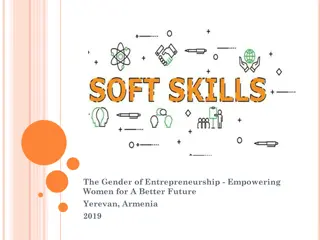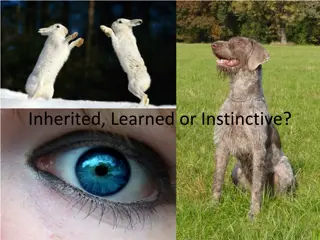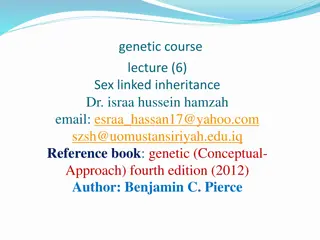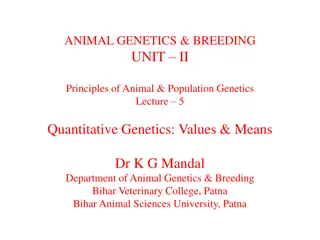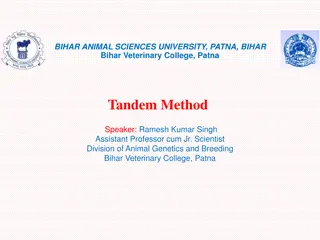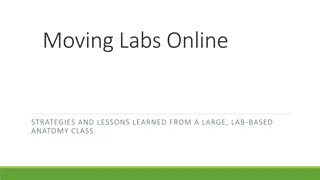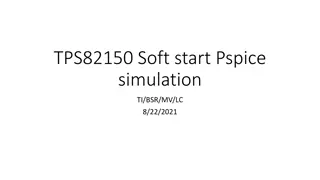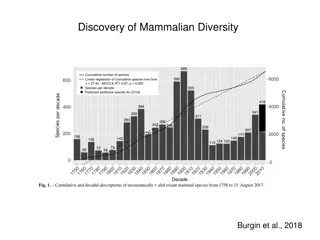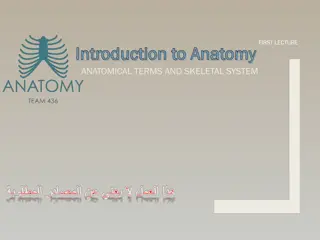www-systemskills-in-20-important-soft-skills-for-freshers-
While hard skills are important for performing the tasks of a job, soft skills are essential for succeeding in the workplace. They help you build relationships, solve problems, and work as a team. Whether you\u2019re just starting your career or looking to move up the ladder, honing your soft skills
2 views • 3 slides
Unveiling the Power of Soft Skills in Professional Success
Soft skills play a crucial role in enabling individuals to interact effectively and achieve their goals. The types of soft skills, including communication, leadership, influencing, interpersonal, and personal skills, highlight the diverse abilities needed to navigate today's dynamic work environment
0 views • 12 slides
Unraveling the Mystery of Traits and Genes
Explore the fascinating world of traits and genes, understanding how they are passed down from parent to offspring through chromosomes. Delve into the role of genes in controlling various traits such as hair color, eye color, and even unique characteristics like detached earlobes and widow's peak. D
0 views • 11 slides
Understanding Cultural Traits and Complexes in Society
Culture is a complex whole that encompasses various aspects such as knowledge, beliefs, arts, morals, laws, customs, and more. Cultural traits, at the simplest level, are individual tools, acts, objects, or beliefs related to specific situations or needs, while cultural complexes are groups of inter
0 views • 18 slides
Economic Aspects of Applied Plant Anatomy in Practical Use
Applied Plant Anatomy involves the practical application of anatomical knowledge in various fields such as identification, classification, taxonomic applications, medicinal plants, food safety, wood analysis, forensic investigations, and more. By understanding plant anatomy, professionals can utiliz
0 views • 26 slides
Understanding Inherited, Learned, and Instinctive Traits in Organisms
Traits in organisms can be inherited, learned, or instinctive. Inherited traits are genetic and include characteristics like hair color and disease predispositions. Instinctive traits are inherent behaviors such as sleeping and grooming. Learned traits are behaviors acquired for survival, like house
0 views • 20 slides
Understanding Sex-Linked Inheritance: Key Concepts and Examples
Sex-linked inheritance refers to the transmission of genetic traits determined by genes located on the sex chromosomes. This type of inheritance differs from autosomal inheritance due to the unique characteristics of the X and Y chromosomes. In organisms with XX/XY sex determination, genes on the X
1 views • 21 slides
Exploring Plant Traits: Do Plants Exhibit Variation in Traits?
Discover in this lesson whether plants display variations in traits through the measurement of plant lengths. Students analyze data tables of carrots and leaves to observe trait variations and discuss patterns found in bar graphs and data tables. The focus is on understanding how to identify and int
0 views • 11 slides
Exploring Leadership Theories: Traits and Behaviors
Leadership theories have evolved from trait theory focusing on personal qualities to behavioral theories emphasizing actions and interactions. While early research sought universal traits for leadership, it encountered challenges due to varied traits among leaders and non-leaders. Behavioral theorie
2 views • 29 slides
Energy and Sports Drinks Dominate Non-Alcoholic Beverage Market Segments
Non-Alcoholic Beverages Market By Product (Bottled Water, Soft Drinks(Carbonated Soft Drinks, Non-Carbonated Soft Drinks, Energy & Sports Drinks), Juices(Orange Juice, Apple Juice, Grapefruit Juice, Pineapple Juice, Grape Juice and Others), Ready-to-
0 views • 4 slides
Understanding Hard and Soft Acids and Bases (HSAB Principles) by Dr. Gurpreet Kaur
Delve into the world of Hard and Soft Acids and Bases (HSAB) with Dr. Gurpreet Kaur as she explains the characteristics of hard and soft acids, Pearson's HSAB principle, applications such as predictions of coordination in complexes, poisonings of metal catalysts, and the classification of acids and
2 views • 17 slides
Comprehensive Soft Skills & Emotional Intelligence Training for Police Officers
This training module aims to equip police officers with soft skills and emotional intelligence, essential for effective communication, conflict resolution, and professional development in policing. It covers understanding concepts, importance of attitude, behavior impact on communication, conflict d
1 views • 26 slides
Contrasting Qualitative and Quantitative Traits in Genetics
Genetic traits in organisms can be qualitative or quantitative, with qualitative traits controlled by single genes and showing distinct variations, while quantitative traits are influenced by multiple genes and environmental factors, resulting in continuous variations. Qualitative genetics focuses o
0 views • 13 slides
Exploring Soft Skills Through Literature: A Path to Personal Development
Soft skills encompass a blend of personality traits, communication proficiency, and positive attitudes that set individuals apart. Originating in the US Army in 1972, soft skills include time management, teamwork, and confidence. Developing soft skills helps individuals excel in problem-solving, tea
0 views • 19 slides
Understanding Anatomy: Branches and Components of the Human Body
Anatomy, the study of body tissue structures, encompasses various branches including Gross Anatomy, Systematic Anatomy, and Microscopic Anatomy. Osteology focuses on the skeleton's components and functions as a crucial support system for the body, aiding in movement and protection of organs.
5 views • 12 slides
Developing Your Human Capital: The Power of Soft Skills
In today's competitive job market, the importance of soft skills in developing human capital cannot be overstated. Building attributes like communication, teamwork, and adaptability can significantly impact career success and personal growth. Investing in oneself through education and personal devel
2 views • 16 slides
Understanding Acquired Traits and Learned Behaviors in Living Organisms
Acquired traits are physical characteristics acquired during a living thing's lifetime, such as scars, and are not passed down from parents. Many acquired traits are also learned behaviors, like reading or flying, which animals develop after birth. Learned behaviors, unlike inherited instincts, are
4 views • 15 slides
Enhancing Soft Skills: Learning Objectives, Quizzes, and Discussions
Explore the world of soft skills with defined objectives, quizzes, and engaging discussions. Learn to identify, evaluate, and rate soft skills through practical scenarios. Enhance your communication, problem-solving, and interpersonal skills in various workplace situations. Dive into self-improvemen
0 views • 13 slides
Understanding Quantitative Genetics Principles in Animal Breeding
Quantitative genetics focuses on the inheritance of characteristics based on degree rather than kind, compared to qualitative genetics. It involves polygenes controlling quantitative traits, which exhibit continuous variation and can be measured using metric units. Qualitative traits, on the other h
0 views • 22 slides
Tandem Method in Animal Breeding: Sequential Traits Selection
Tandem method in animal breeding involves selecting useful traits sequentially to improve genetic performance. Breeders focus on one trait until a desired level is achieved before moving on to the next trait. While effective in targeted improvement, the method can lead to loss of previously improved
0 views • 6 slides
Sexual and Reproductive Anatomy Lesson for 5th Grade
Explore the essential aspects of male and female sexual and reproductive anatomy in this detailed 5th-grade lesson from the Rights, Respect, Responsibility sexuality education curriculum. The images provided offer a visual guide to understanding external female anatomy and reproductive anatomy, aidi
0 views • 5 slides
Understanding Soft Gamma-Ray Emissions from Pulsar Polar Caps
Soft gamma-ray emissions from the polar cap cascade region are a subject of interest in astrophysics, with studies focusing on the fundamental physical processes of pulsars and potential origins of non-thermal X-ray emissions. Researchers explore the emission processes, polar cap accelerators, casca
0 views • 16 slides
Linking Soft-Ray Pulsar and Fermi LAT Pulsar Populations
This research presentation explores the connection between the soft-ray pulsar population and the Fermi LAT pulsar population, focusing on observational data and methodologies for increasing the sample size to enhance our understanding of high-energy pulsars. The study outlines the identification pr
0 views • 13 slides
Embracing Soft Skills for Youth Employment in Uganda
Understanding the importance of soft skills in achieving decent employment for Ugandan youths. The research explores the skills gap, challenges in acquiring soft skills, and the impact on job prospects. Recommendations aim to enhance the educational system to better prepare graduates for the workfor
0 views • 39 slides
Soft Heap and Soft Sequence Heaps: Properties and Applications
Explore the properties and applications of Soft Heap and Soft Sequence Heaps, discussing how corruption handling and selection functions are optimized in these data structures. The concept of car-pooling and the simplification of heap operations are highlighted, along with references to relevant res
1 views • 10 slides
Overview of Soft Sequence Heaps in Algorithms
Soft sequence heaps are a specialized data structure designed to handle corruptions in heap operations efficiently. This technology, introduced at Aarhus University, simplifies heap manipulation, particularly in car-pooling and other applications, with a focus on minimizing corruptions during extrac
0 views • 10 slides
Strategies and Lessons Learned for Moving Anatomy Labs Online
Explore strategies, challenges, and tips for transitioning large lab-based anatomy classes online. Discuss considerations, effective delivery options, assessment methods, and examples like Human Anatomy activities. Learn from an Associate Professor's experience teaching human anatomy and physiology
0 views • 13 slides
Soft Start Simulation Results for TPS82150 Power Module
Results of soft start simulations for TPS82150 power module show that the rise time for output voltage slightly exceeds the expected soft start time due to voltage ramping up to 0.8V only. Different scenarios for input voltage and output current levels are explored, highlighting the impact on rise t
0 views • 4 slides
Fascinating Discoveries in Mammalian Diversity
Recent scientific findings have unveiled new species of mammals like the gymure Podogymnura intermedia in the Philippines and chipmunks Tamias cratericus and T. grisescens. Notably, the discovery of Rice's whale highlights the critical condition of this species. The evolution and varied characterist
0 views • 28 slides
Understanding Soft Gelatin Capsules and Their Advantages
Soft gelatin capsules are one-piece forms enclosing liquid or semi-liquid fill, offering advantages such as improved bioavailability, enhanced drug stability, and easy swallowability. They come with unique features like diverse colors, sizes, and shapes. Despite their benefits, they have limitations
0 views • 28 slides
Soft Skills Training Program Evaluation at an Indian Garment Firm
This study evaluates the impact of the P.A.C.E. program, focusing on soft skills training at an Indian ready-made garments firm. The research explores the inculcation and productivity-enhancing effects of soft skills in the workplace, questioning the profitability of general training provided by fir
0 views • 29 slides
Guidelines for Implementing Soft Skills Development Programs
The breakout session at the 2018 PARIS21 Board Meeting discussed the importance of developing soft skills alongside technical skills. Participants highlighted the need for tailored capacity assistance with a country-led focus. Strategies suggested included comprehensive capacity assessments, leaders
0 views • 7 slides
Soft Skills and Life Skills Overview
Soft skills, also known as life skills or people skills, encompass interpersonal and social abilities that enable effective interaction with others. They are acquired through daily life experiences and reflections, in contrast to hard skills gained through formal education. This overview delves into
0 views • 36 slides
Developing Essential Soft Skills for Success in College and Career
Explore the importance of soft skills such as strong work ethic, positive attitude, good communication, time management, and teamwork in preparing for college and career success. Discover how these skills, along with hard skills, contribute to personal and professional growth. Gain insights on self-
1 views • 11 slides
Reboot Training - Developing Soft Skills for Employability
Reboot Training helps unemployed and underemployed higher education graduates recognize, develop, and showcase their soft skills to increase employability in today's changing work environment. Participants learn the importance of soft skills, how to acquire and demonstrate them effectively, and how
0 views • 22 slides
Understanding Fuzzy Soft Set Approach to Decision Making Problems
Real-life problems often involve imprecise data, requiring mathematical principles like fuzzy set theory. Dr. V. Anusuya explores the application of fuzzy soft sets in decision making scenarios, discussing their role in handling uncertainties and approximations. The introduction covers various theor
0 views • 16 slides
Comprehensive Guide to Cardiovascular Imaging and Anatomy
Explore a detailed collection of images showcasing cardiovascular imaging, radiological anatomy of the chest, vascular anatomy, and pulmonary conditions like embolism. Discover the gold standard for diagnosing pulmonary embolism, as well as CT angiograms and aortic arch anatomy. Engage with visuals
0 views • 59 slides
Understanding Soft Forks in Blockchain Governance
Explore the nuances of soft forks, governance, and culture in the context of blockchain technology. Learn about the basics, notable soft forks, historical perspectives, and diverging views within the community. Dive into the practical implications and significance of these concepts in the ever-evolv
0 views • 45 slides
Introduction to Anatomy: Anatomical Terms and Skeletal System
An introduction to anatomy covering anatomical terms and the skeletal system. It defines anatomy, explains anatomical sciences, discusses the skeletal system, and outlines anatomical terminology including terms of position. The content includes objectives, classifications of bones, and different ana
0 views • 28 slides
Anatomy Written Tests Overview with Sample Questions
Explore different types of anatomy questions commonly seen in written tests, including general anatomy, structural anatomy, functional anatomy, topographical anatomy, imaging anatomy, clinical anatomy, microscopic anatomy, and embryo-related topics. Sample questions and answers are provided for each
0 views • 12 slides

